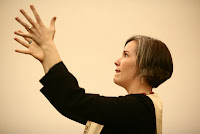In his commentary The Early
Christians Letters for Everyone, N. T. Wright provides a wonderful insight on
what it means to be a servant leader.
His comment is based on these verses:
“I
have a special concern for you church leaders. I know what it's like to be a
leader, in on Christ's sufferings as well as the coming glory. Here's my
concern: that you care for God's flock with all the diligence of a shepherd.
Not because you have to, but because you want to please God. Not calculating
what you can get out of it, but acting spontaneously. Not bossily telling
others what to do, but tenderly showing them the way.” (1 Peter 5:1-3, The Message)
Wright
points out that such leadership is not based on knowledge but practice. He says, “I would rather belong to a group or
a fellowship where the ‘leader’ had no idea about ‘leadership,’ but was
out-and-out committed to God and to the gospel, than one where the person in
charge had done three or four courses on ‘leadership’ but found it left little
time for studying scripture and for praying.”
The
point is that real leadership comes out of the practices of one’s life—both internal
and external. The best leader doesn’t
think so much about what to do but who he or she is becoming in relation to God. This requires taking the time to gain the
eternal perspective, patience, and insight provided by spiritual practices. As
a result, the leader is prepared to do what is necessary to serve others. The “doing” comes out of the “being.”
In
the course I teach for Central Seminary entitled “Formation for Christian
Ministry,” we probably spend more time on spiritual practices than on the
techniques of being a minister. We learn
about spiritual disciplines, keep a journal, and learn to reflect on where our
stories intersect with the story of God.
We also do some personality inventories that help us to understand our
natural tendencies in work, communication, and interaction with others, but I
hope we always interpret the resulting insights through the lens of what it
means to be a fully committed follower of Christ. As we know who we are in relation to God, we
become people God can use. I agree with Wright (and Peter) that this is
the path to true leadership.

Comments